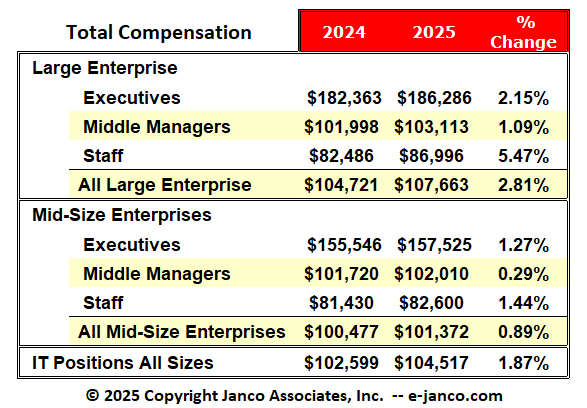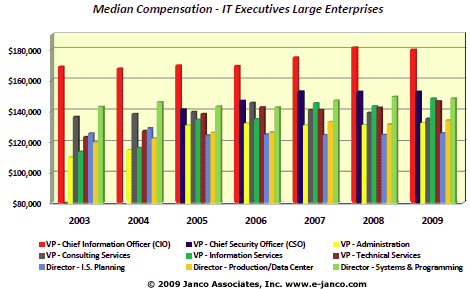IT Pay Cuts: Are You Next?
As more companies enforce across-the-board pay cuts and unpaid furloughs, a rising tide of IT professionals is seeing its annual compensation decline and must decide whether to switch employers as a result.
unpaid furloughs, a rising tide of IT professionals is seeing its annual compensation decline and must decide whether to switch employers as a result.
Order IT Salary Survey Download IT Salary Survey Summary
Among the companies that have instituted broad pay cuts this year are National Public Radio, the New York Times, Nucor and the Georgia State government. These organizations are slashing the pay of even their most in-demand IT staff, such as Web developers, information security specialists, enterprise resource planning gurus and IT architects.
Some IT professionals jump ship immediately after their pay is cut.
For example, one Indiana firm eliminated annual bonuses at the end of 2008 for all of its employees, including the IT staff. A few months later, all employees making more than $90,000 saw their salaries cut by 10%, which impacted two IT managers. Both IT managers left the firm within a few months of the10% pay cut, a knowledgeable source said.
IDG, the parent company of Network World, instituted across-the-board pay cuts of 10% in May. Rob Rebecchi, Manager of Technology Support Services for IDG, says his group of five analysts, who handle tech support calls for the Framingham, Mass., publishing firm, was affected by the pay cut.
“I’ve lost one junior analyst since then,” Rebecchi says. “All the IT groups in IDG were affected by the pay cuts, and there have been some [staffing] changes in each group as a result.”
Overall, IT pay and perks continues to shrink in 2009. A Janco Associates survey released in June found that total compensation for IT professionals fell an average of 19% between January 2008 and June 2009.
Summary Results and Changes in Demand for IT Jobs 2009
Current Median IT Salaries

For the latest data go to the current IT Salary Survey
Companies must include IT workers in their across-the-board pay cuts, argues Sarah Mitchell, associate director of The Alexander Group, a San Francisco recruiting firm. The Alexander Group has instituted salary cuts for everyone, including IT staff. No one has left the firm as a result of the pay cuts, she says.
“To exclude one group would be a really bad idea because of morale issues,” Mitchell says. “If you have to do it, you have to do it across-the-board. You can’t release anyone from the pay cut.”
Mitchell recommends that companies who cut the pay of in-demand IT professionals respond by offering training opportunities and new responsibilities.
“It’s a cost/benefit analysis,” Mitchell says, adding that instituting a 5% pay cut is huge boon to a company’s bottom line. “You’re going to risk losing people, but it’s worth the risk because of the broader morale drop you would see if different groups of employees were treated differently.”
Another suggestion from Mitchell: “Commit to your team that you will make up the pay eventually or try to get them whole by a certain point in time.”
Cutting the pay of IT professionals is risky, agrees David Foote, CEO of Foote Partners, an IT compensation research firm in Vero Beach, Fla.
“I’ve heard of it, but it’s not widespread,” Foote says. “Retention is a huge problem in IT, and [companies] need to start realizing that. If you make across-the-board pay cuts, the best people will leave.”
Foote says that layoffs are more common than pay cuts for IT professionals.
“What companies are doing is firing people and putting the work on the backs of other people,” Foote says. “We see a lot of highly paid but burned out people in IT.”
Foote says IT department pay cuts are more common in small and midsized firms where employees have an equity stake in the business.
“My advice to CIOs is — without a doubt — don’t cut pay unless you’re a small company and you have other avenues of rewarding employees,” Foote says.
Some organizations are instituting pay cuts in the form of unpaid furloughs. National Public Radio is requiring all of its employees to take five days of unpaid leave, which equates to a 2% pay cut. Of NPR’s 840 employees, 72 are IT professionals, including 45 in Information Services, 17 in Distribution and 10 in Digital Media.
NPR spokeswoman Danielle Deabler says all of the steps that NPR has taken to limit employee compensation – including eliminating NPR’s contributions to retirement accounts, eliminating its “flex” credit, implementing the five-day furlough, changing three NPR-paid holidays into unpaid holidays, and eliminating pay increases for 2010 — apply to all of its union and non-union employees, including IT staff.
Dennis Haarsager, NPR’s senior vice president for systems resources and technology, apparently fared worse.
“While employees [faced] these cuts effective May 1, these cuts were already implemented with NPR leadership at the VP level or above effective April 1,” Deabler says. “Additionally, NPR leadership did not receive the annual increases given to staff in January 2009 and [worked] the final two weeks of fiscal year 2009 without pay.”
The Georgia Technology Authority, which is responsible for IT infrastructure and managed network services for all state government agencies, was required by the state to institute three furlough days for its employees, which equates to a 1% pay cut. No one has left the agency since the furloughs began, says Michael Clark, Director of GTA’s Office of Communications.
“We’ve already had one furlough day – the Friday before Labor Day – and we have two more scheduled: the Wednesday before Thanksgiving and the Wednesday before Christmas,” Clark says. “You don’t come to work, and you don’t get paid for that day. You cannot take it as a vacation. It helps cut the state budget because you come off the payroll.”
Clark says GTA’s 170 employees have not complained about the furloughs, which affected everyone including Georgia’s CIO Patrick Moore.
“I haven’t heard any griping about the furloughs,” Clark says. “People understand what’s going on in the economy. State revenues have declined. What I’m hearing from people is that they don’t mind taking a furlough day if it means no more layoffs.”
GTA has shrunk from a staff of 550 to 170 employees in recent months, because of the elimination of several functions including project management as well as the award of two major outsourcing contracts. On April 1, GTA transferred 291 employees to IBM as part of a 10-year, $873 million IT infrastructure services deal struck last year. On May 1, GTA transferred 33 employees to AT&T as part of a five-year, $346 million managed network services deal.
With all the cuts, GTA has retained its expertise in service management, information security, IT standards and IT policy setting.
Clark doesn’t think the furloughs will affect GTA’s ability to retain top IT talent, which is always a challenge for state and local government agencies. No furloughs are scheduled for 2010.
“We only got three furlough days, and when the economy turns around the state revenues will come back and the pressure for the furloughs will no longer be there,” Clark says. “So far it has not had an impact on our ability to get the work done.”



